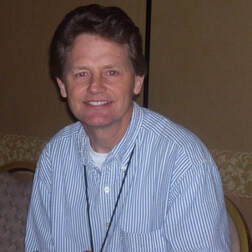
With church attendance declining nationwide, people are asking about the efficacy of religion. We don’t need to go to church to be good people, and there is no guarantee that people would be better because of church. Many people are beginning to ask, what is religion, and does it really serve a purpose in today’s ever-changing society? And who are we as UUs? Are we really a religion or just more of an ethical society?
Here is the text of Bruce's sermon:
Presented by Bruce Maxwell on December 17, 2023 at UUCLC
I can imagine that when you first read the title of this sermon, you asked yourself, “What?” Well, let me explain the significance of the question.
Church attendance is declining nationwide According to the Hartford Institute of Religion Research, more than 40 percent of Americans “say” they go to church weekly. As it turns out, less than 20 percent are actually in church. In other words, more than 80 percent of Americans are finding other things to do and places to be on weekends. “The underlying challenge for many is that their lives are stretched like a rubber band about to snap—and church attendance ends up feeling like an item on a checklist that's already too long.” Americans who don't believe in religion don't often attend church and they feel unsupported in the midst of any grief and suffering they face.
We also know that somewhere between 4,000 and 7,000 churches close their doors every year. Some researchers put that estimate even higher - between 8,000 and 10,000 churches.
More than half of the people who believe but don't attend religious services regularly are women, and they are more likely than men to say they haven't found a house of worship they like and have found other ways to put their faith into practice. 54% said it's because they haven't felt welcomed by congregations. Among Millennials, only 36% identify with a church.
A Faith Communities Today (FTC) survey shows that between the year 2000 and 2020, the average number of people in church congregations dropped from 137 to just 65 by 2020 and by 2023 had dropped to 60.
In 2021, Gallup shared that in 2021 church membership dropped below 50% nationally for the first time. “More people have left the church in the last 25 years than all the new people who became Christians from the First Great Awakening, Second Great Awakening, and Billy Graham crusades combined,”
So why do Christians go to church?
According to a Pew Research Center Survey:
- (81%) say To become closer to God.
- (69%) So their children will have a moral foundation.
- (68%) To become a better person.
- (66%) For comfort in times of trouble or sorrow.
- (59%) They find the sermons valuable.
The number one reason people are attending church less or not at all is, they “stopped believing in the religion’s teachings.” That and the fact that present-day Christians are perceived as judgmental, boring, hypocritical, out-of-touch, anti-gay, old-fashioned, and too political. Among Millennials, only 36% identify with a church.
Here are the 8 core reasons people don't go to church:
- They practice their faith in "other ways." (37%)
- They are not believers. (28%)
- They haven't found a house of worship they like. (23%)
- They don't like the sermons. (18%)
- They don't feel welcome. (14%)
- They don't have the time. (12%)
- Poor health or mobility. (9%)
Jim Davis and Michael Graham did a survey of 1,043 Americans to determine the scope of what they call, “dechurching” — which was defined as having attended service at least once a month in the past and now attending less than once a year.
And in their book, titled, “The Great Dechurching: Who’s Leaving, Why Are They Going, and What Will It Take to Bring Them Back?”
They sorted dechurched Americans into two major categories: the “casually dechurched,” those who lost the habit of attending services because they had “scheduling conflicts” or moved and the other group, called “church casualties,” who stopped attending because of conflict within their church or because they had personally experienced harm connected to church.
Their survey found that many dechurched Americans might return to churches if they found a stable and healthy congregation. However so far, the only religious groups to boost attendance over the past five years were Muslim, Baha’I, Jewish, Hindus and UUs.
It is perhaps no surprise that the Unitarian Universalist Association is one of the fastest-growing denominations in the country, ballooning 15 percent over the past decade, when other established churches were shrinking. There were 148,232 members in the US in 2021 with 1,048 congregations and over 800,000 members worldwide.
The dechurched also differ in why they might return to church. Mainstream evangelicals were looking for friendship, while mainline and Catholic dechurched Americans were more interested in spiritual practices and outreach programs. Davis and Graham remain hopeful about the future and end their book with a set of appeals for church leaders to be patient. The Great Dechurching didn’t happen overnight and won’t be reversed quickly. Church leaders will need what the authors call “relationship wisdom” and a “quiet, calm and curious demeanor” where leaders are quick to listen and slow to preach to their congregations.
SO WHY DO WE NEED CHURCHES?
The communities where we live and work and go to school are constantly changing. The nation and the wider world is constantly changing. There is so much that we do not control. We face everyday challenges as we go through the various phases of our own lives and the lives of family and friends. And in these challenges, there are many opportunities for us to stretch and grow.
We don’t need to go to church to be good people, and there was no guarantee that people would be better because of church. However, for most church goers, church is where we mark certain cultural and life transitions: child dedications, graduations, marriages, anniversaries, celebrations, and memorials when life comes to an end as we did for Shirley Howland.
It is where we bring our joys and sorrows and know that we are not alone. At church we can find inspiring messages from the pulpit, music to soothe the soul (thank you Carol), intellectual engagement and an opportunity to be active in a caring community, all of which contribute to leading a healthy, emotional life.
MAYBE INSTEAD WE SHOULD BE ASKING What is “Religion”? Religion is an organized group of people who share common beliefs who seek together to make meaning of life.
In a conversation last week Peter Windrem, he pointed out that at the very beginning of this congregation they made the conscious decision not to use the word “church” when naming this group but instead chose the word “community” to represent us.
Let’s do a mental exercise. Visualize this scene with me. You step into an elevator which is already occupied with a pleasant looking man. You press the button for the third floor and as the doors close, the man says to you, “Tell me what is Unitarian Universalism anyway?” So, you have maybe 30 seconds to come up with an answer. What would you say?
When asked this question, William (Bill) Sinkford, who was at the time the first Black President of the Unitarian Universalist Association, and also the first black religious leader of a predominantly white denomination in America, came up with these words:
Unitarian Universalism is a world-wide religion where:
I believe in you.
You believe in me.
And together we believe we can help heal the world
So, think about these three sentences.
I believe in you.
You believe in me.
And together we believe we can help heal the world.
It doesn’t start out saying, “I believe in one God, the father almighty, the maker of heaven and earth…” It starts by saying I believe in you. I believe in your humanity and your goodness and your potential and you believe the same things about me.
So, at the very heart, Unitarian Universalism is a very earth-bound, human-focused religion. And there is space for there for a divinity, there is space for God for those of us who find meaning in that word and in that reality, but we start with our precious humanness.
And it’s bigger than that. It’s not just about us or what we believe about each other, It’s about what we believe we are called to do in the world. It’s a faith not just of words but of action.
Fred Christiansen remarked last week that we view worship not as reverence and adoration for a deity, but along the lines of the old English origin of the word - giving worth to something. We are here because we value what we receive.
The religion of UU includes what is called “theological pluralism.” Which means we have different and diverse answers to theological questions like, Where do we come from? Is there a God? And what happens when we die? We believe that there are many paths to truth and the answers to these types of questions, and we support individuals in their free and responsible search for answers to these questions.
We draw upon six sources of faith, including
- direct experience of the holy,
- wisdom from other world religions,
- the words, deeds, and lives of great people,
- earth-based traditions,
- humanist teachings and the guidance of reason
- and the knowledge and wisdom of science.
Unitarians believe Jesus to be a created being, finite and not infinite. Unitarians therefore generally hold Jesus to be a man, human in soul and body, not so much a Son of God but more of a representative prophet. His true greatness was in his devotion to the Divine, his sympathy with suffering mankind. Today we have members who see Jesus as their model, their savior, or one of their teachers.
As a non-credal religion, Unitarian Universalism joins only a handful of world religions that challenge their members to seek truth and spirituality in the world around us.
Contrary to what many outsiders believe, this doesn’t mean that “anything goes” for UUs. As you know, in the place of formal statements of belief for all worshipers, Unitarian Universalism offers Seven Principles that can be found on the back of your Order of Service, that serve as a sort of ethical guidelines to keep us from wandering into the weeds as we follow our individual paths to spirituality and our search for answers.
And we covenant to accept these Principles. A covenant is a promise to one another and to other UU congregations to work toward living these seven principles. Covenants are about care of the whole, not just some of the group.
As responsible religious seekers, we recognize that we are privileged to be free, to have resources to pursue life beyond mere survival, to continually search for truth and meaning, to exist beyond bonds of dogma and oppression, and to wrestle freely with truth and meaning as they evolve. Many of us have been drawn to Unitarian Universalism because we wanted a place to be religious, but not to be told what to think.
This privilege calls us not to be isolated and self-centered, believing that our single perspective is superior to all others, but rather to be humble, to be open to the great mysteries of truth and meaning that life offers. And those mysteries may speak to us through our own intuition and experience – but also through tradition, community, conflict, nature, and relationships.
As a faith tradition, Unitarian Universalism makes sacred the right and responsibility to engage in this free and responsible quest as an act of religious devotion. Institutionally, we have left open the questions of what truth and meaning are, acknowledging that mindful people will, in every age, discover new insights.
Please think about what brought you here? Many of us came from other religious backgrounds. We often felt out of sync with the beliefs of those churches. Think about your own journey to this pew you are sitting on, a couple of weeks ago in his sermon Tom Marquette asked, “Is this a faith you were born into or one you have chosen?”
In all likelihood, something happened in you. Were you made uncomfortable when those around you said that they don’t believe in evolution, or did they comment that carbon dating is fake science, fooling scientists into thinking that the earth is older than the bible says it is.
I know, it was probably when they told you that there is only one true faith, and people who aren’t Christians are doomed to go to hell, (whatever hell is).
Or maybe you left because you could no longer pretend to be like everyone else there?
As I grew into adulthood, I hadn’t really retained much from Sunday school except that God was everywhere. That HE was inside of me and everyone and everything around me. I thought that this was a very strange place for God to hang out, and that he must have some sort of cozy studio apartment setup in my heart since he spends so much time there. I imagined that every time I prayed, he’d pick up a little red telephone in his cozy heart apartment and listen to my prayers. I mean, how else would He hear them?
As adults when my wife and I decided to look for another religious home, I knew I wanted to find a community where someone wouldn’t tell me what to think. So, we visited a UU Fellowship in St. Louis where we lived at the time and realized that this place was really different. We wanted to know more. And now, 33 years later, we’re still here, with you.
Our liberal Unitarian Universalist community isn’t based on a holiness, or a miracle performed by the son of God, in fact much of UU tradition is to be skeptical around such claims. But we are logical and rational enough to not rule out moments that are bigger than we can understand. We are logical and spiritual enough to hold mystery open. Being part of a community congregation is a context in which to consider the inexplicably profound experiences of our lives.
Churches should be filled with honest, searching, compassionate, and loving people. And it should be a place where we listen, think, consider, and act. During tough times, most people will rely on their religious beliefs to help carry them through adversity.
I think we attend UUCLC because this is the place where we can love one another. It seems to me that love is the force behind all the UU principles. Our relationships with others is what life is all about.
And in this community, we are instilling a moral foundation in our families, becoming a better person, seeking comfort in times of trouble, finding value in the sermons, and being part of a community of faith. We can encourage one another, serve one another, instruct one another, honor one another, be kind and compassionate to one another and do good works.
Unitarian Universalism is a Living Tradition which means that ours is a faith that evolves. Ours is a religion that changes. We are part of a faith tradition that honors history, responds to the present, and creates the future. If you read the articles in this year’s UU World, you can see that once again, we are evolving to address the needs of our society and those reaching out for help and belonging. We do it in covenant, or promise with one another, and we do it imperfectly. Unitarian Universalism is a religion built on relationships and mutual respect and is a spiritual response to the fact that we are inextricably interconnected to one another, to all sentient beings, and to the universe.
Belonging to an active, caring, reaching-out congregation is similar to belonging to a gang of sailors on a big ship slowly sailing around the world. We meet people we wouldn’t meet on our own. We hear stories and learn of the challenges and cultures of others. Our world expands. Because week by week and year by year we are together here on our big old ship. We are learning about our world and its people and needs. We encounter mystery and need to share those experiences. We are looking outwards into our community to see where justice is going and how our country is doing. Thus, all the traditions of faith say, this is holy and this is community.
Nancy Rhoades turned me on to the UU Hysterical Society, and I want to end with this short video with the title, “I Am The Very Model of a Modern Unitarian.”
https://www.uuhystericalsociety.com/resources-1/2021/6/16/i-am-the-very-model-of-a-modern-unitarian

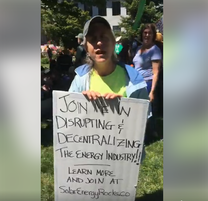
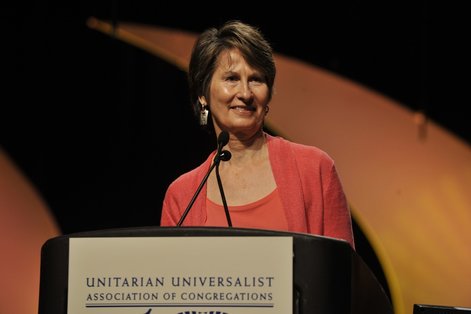
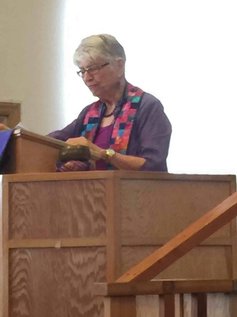
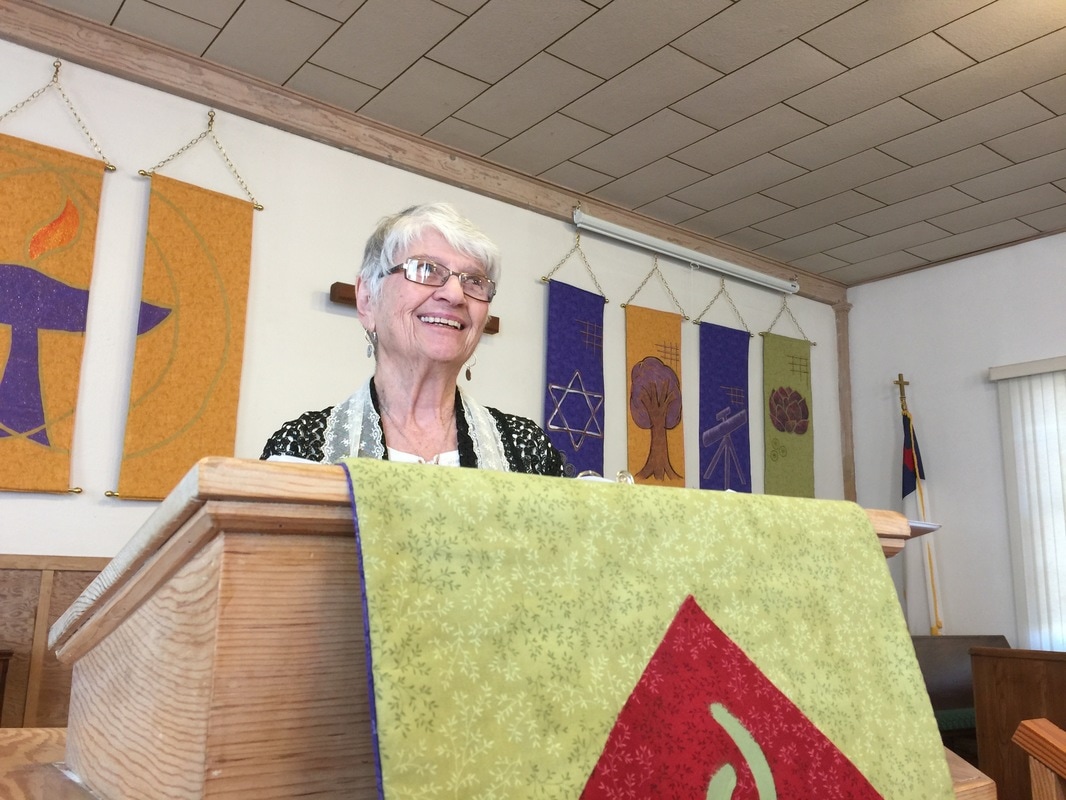
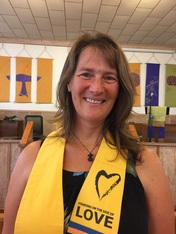
 RSS Feed
RSS Feed
